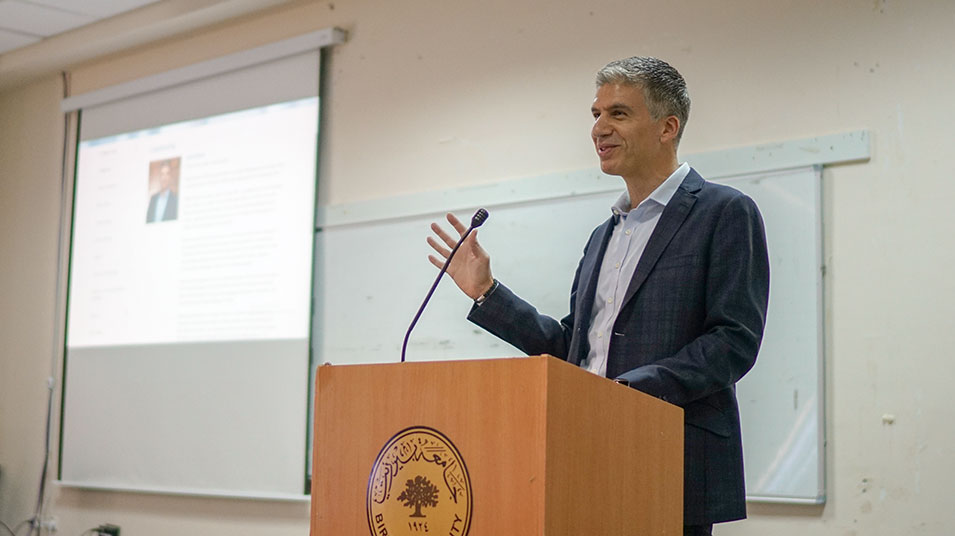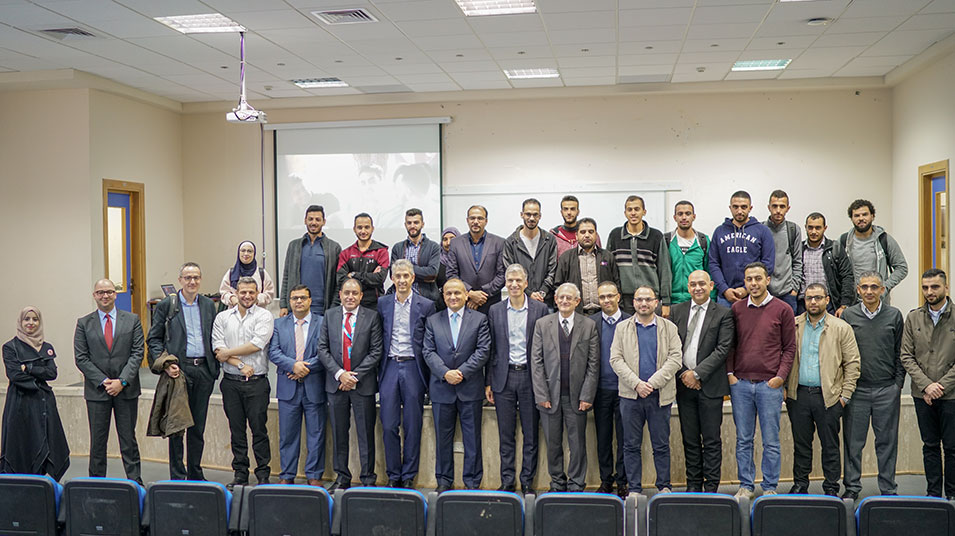Rami Rahim discusses Silicon Valley experiences, future of engineering in Birzeit lecture
Rami Rahim, the chief executive officer of Juniper Networks, a multinational network and security solutions company, gave a lecture at Birzeit University on his experiences in Silicon Valley, on Monday, November 12, 2018.
In the lecture, organized by the Faculty of Engineering and Technology at Birzeit University together with the Innovation and Entrepreneurship Unit, Rahim shared his experiences at Juniper Networks with the attending students, faculty members, and private-sector representatives, both as a junior networks engineer in 1997 and, nearly 17 years later, as the CEO.
Rahim began the lecture by thanking Birzeit University, “one of the most prestigious seats for higher education in Palestine,” for hosting an event that allows future engineers to explore their aspirations and goals in an environment that encourages vibrancy, openness, dialogue, and communication.
Rahim, who was born in Beirut, Lebanon, and whose parents were born in Safed, said he was very grateful for his engineering education, and noted that the attending engineering and computer science majors made the right academic and career choice.
“I think a degree in engineering, computer science, and these related engineering disciplines is a great idea. It will be one that will be the foundation of what I hope to be a great career, but maybe even more importantly, a meaningful life,” Rahim addressed the students, adding that they will witness, and help usher in, great technological changes.
Rahim told the attendees that in the near future, everything will be connected to the internet, autonomous cars that save lives and decrease traffic congestion will be the norm - and change the nature of city planning - and that humanity will have free energy from renewable energy sources.
“This is certainly an exciting time to be an engineer and a computer scientist because, in these roles, you have an opportunity not just to participate in this world that I described, but also to be a pioneer and help shape it. That, to me, is why I became an engineer,” Rahim commented, telling the future engineers that they will be builders in that world, and push the boundaries of what they’re learning.
Rahim, in addition to discussing the prospects of engineering in the future, gave the students a few pieces of advice on how to handle future failures, successes, teamwork, and everything in between, such as: “don’t dwell on the next career step,” as in, don’t focus on the future and forget the present; “finish what you start,” meaning that students must persevere in the face of hardships and setbacks - he gave an example of Juniper Networks when the dot-com bubble burst and how the company persevered and launched its now famous MX series of routers - and “push yourself out of your comfort zone,” meaning that students have to take risks and find their passion in the process.
After the lecture, Rahim answered the audience’s various questions, which ranged from inquiries about the general state of engineering in Palestine and the future of engineering in general to how Rahim himself found his passion.
Prior to his lecture, Rahim met with Vice President for Academic Affairs at Birzeit University Henry Giacaman, Assistant to the President Aziz Shawabka, and Assistant Professor of Electrical and Computer Engineering Iyad Tumar, and they discussed prospects of cooperation in the internet communications technology sector. Amar Aker, the CEO of Paltel Group, also visited the university with Rahim.
Giacman told Rahim that the university is aware of the importance of the ICT sector and its role in future development for societies, and emphasized the significance of providing a solid foundation for the younger generation that prepares them for careers that address rapidly changing technologies.
That is why, Giacaman explained, the university established the Department of Electrical and Computer Engineering, one of the biggest departments in the Faculty of Engineering and Technology.
Giacaman also mentioned the Palestine-India Techno Park, built on Birzeit University land, which will be the hub for startups and innovative projects in Palestine.
Rahim expressed his enthusiasm for building partnerships with Birzeit University, as he believes that the combination of intellect, education, and access to the internet is able to disrupt an entire industry. “It is important to create a culture of innovation to guarantee a better future for our country,” he said.










